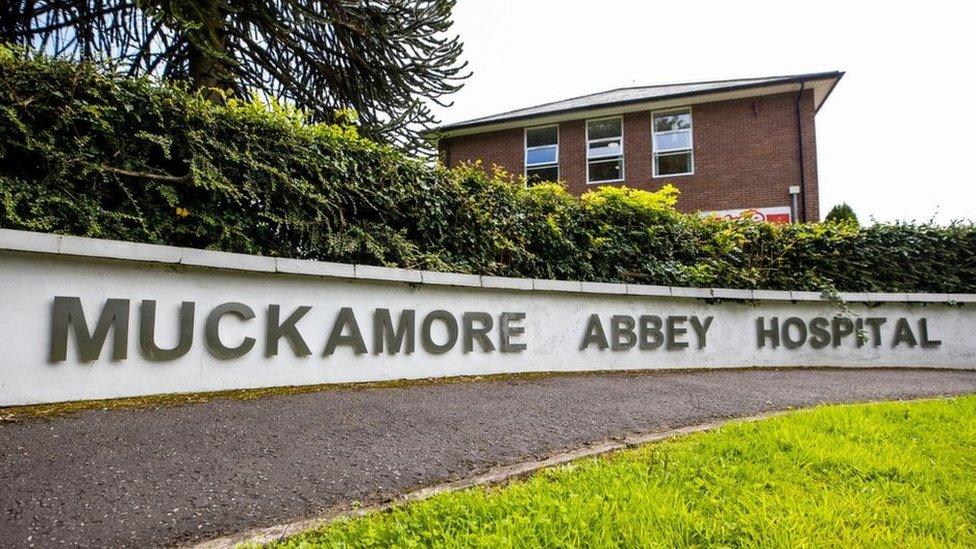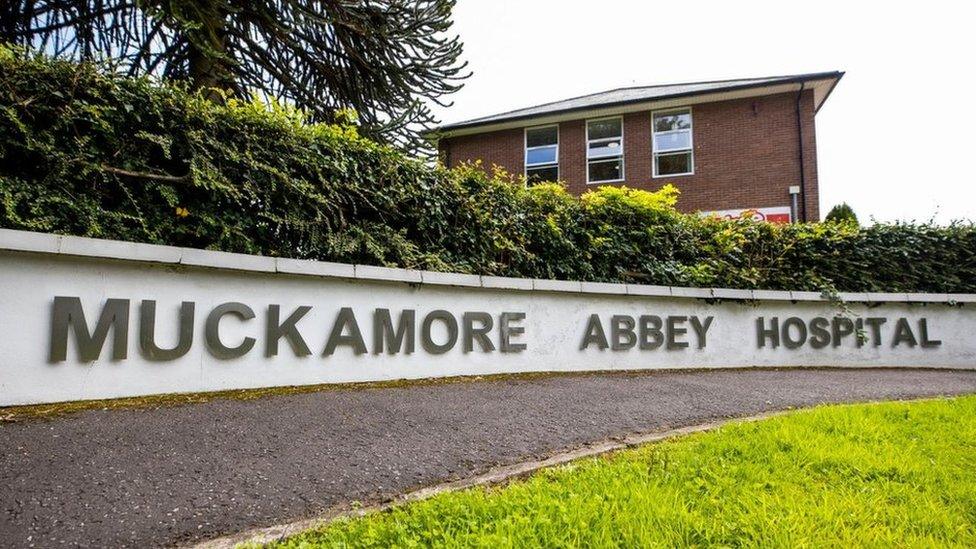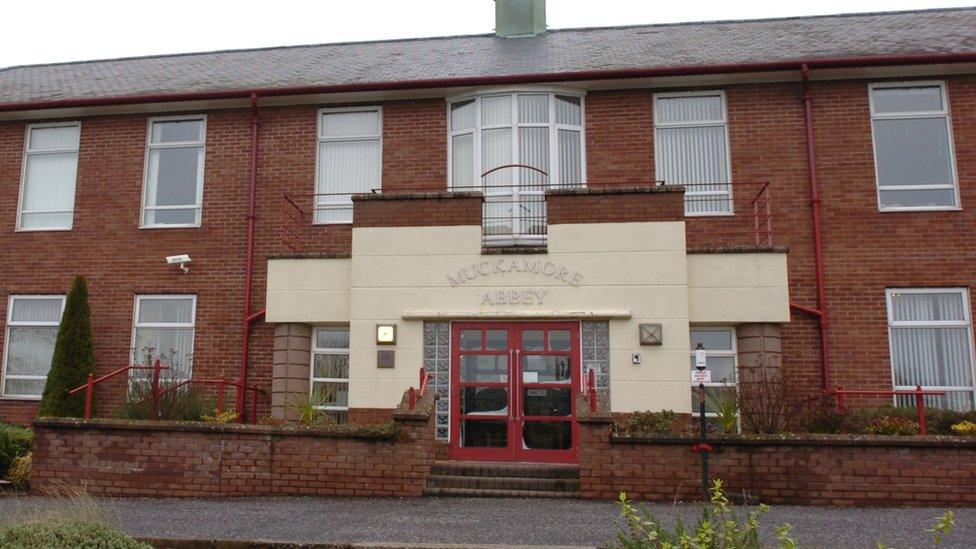Muckamore inquiry: Staff accused of ignoring TB symptoms
- Published

The mother of a patient at Muckamore Abbey Hospital has described how her son contracted tuberculosis (TB) while at the hospital.
She said he had been left severely disabled after a series of associated strokes.
Patient P116 is now 40 years old and has suffered from severe epilepsy since he was a baby.
His mother told the inquiry into abuse at the hospital that her concerns over her son's health were ignored.
She said that even after he began developing symptoms - including losing six stone (38kg) of weight - staff seemed "not to care".
In the end, he was only diagnosed with TB after his mother took him to hospital herself.
P116 has two brothers and lived a rich and full family life, the inquiry heard.
He attended a mainstream school until his epileptic seizures worsened at the age of seven, taking their toll on him and his progress in school.
'Crying in the car park'
His mother told the inquiry his behaviour deteriorated after he was suspended from his day centre, and he was eventually admitted to Muckamore in December 2015.
"I remember it clearly as it was so close to Christmas," she said.
"My husband and I cried our eyes out in the car park. This was the first Christmas our family had not been together."
P116 was initially brought to the Cranfield ward in the facility - he told his mother: "At least I'm not in Muckamore. I'm in Cranfield."
His mother explained: "Muckamore was the bogeyman of the learning disability community in Northern Ireland, something I believe he learned from the resource centre."
'My complaints were ignored'
Nine months after he was admitted, P116's mother said she noticed he seemed unwell.
"He continued to lose weight and I informed Muckamore staff....but they assured me he was eating well and taking exercise, walks around the grounds," she said.
But the weight loss, and other symptoms continued, and he became sicker.
"Our family has a history of bowel cancer, I was desperate for him to be seen by a doctor because of the bleeding and weight loss," she added.
"I knew something was very wrong, my complaints were ignored....I believed he was dying, he had lost six stone in weight."
His mother said she was the one who did all the chasing and pressing for medical help.
"I didn't feel Muckamore was interested in P116's physical health and his evident decline."
Then - after his condition worsened while at home one weekend - he was taken by ambulance to the Royal Victoria Hospital in Belfast where, after a lumbar puncture, he was diagnosed with TB.
The disease is serious and can be fatal if not treated properly.
Scans showed lymph nodes and spleen issues, P116 was crying with pain and was immediately given morphine.
Letter of apology
Due to the delay in the diagnosis and the way the family's complaint was handled, a serious adverse incident review was carried out and P116's mother received a letter of apology from the then permanent secretary at the Department of Health, Richard Pengelly, and Theresa Villiers, who was Northern Ireland secretary at the time.
P116 was discharged from Muckamore while being treated at the Royal and stayed there until 2018, when he was found a place in supported living accommodation.
His mother told the inquiry her son's time in Muckamore remained a "major trauma" for the family and she still found it very difficult to talk about.
She told the inquiry she felt strongly that "independent expert support" should be given to patients abused or neglected in Muckamore, including specialist counselling for the patients and their families.
Historic patient experiences
The inquiry also heard today from a number of other patient experiences, which although they fall outside the inquiry's terms of references because they took place so long ago, they were read to the panel and will provide background and context.
They heard from:
Debbie, Olive and Michael, who spoke on behalf of their late aunt Nancy, a patient from the 1960s to the late 1980s. They described their aunt suffering numerous unexplained injuries, including a broken nose, a serious head injury, a broken leg and injuries to her face "like she'd been in a boxing match".
Noleen, who told the inquiry about late brother Pierce, a patient at Muckamore for about 40 years, from 1966 to 2006, when he was 46 years old. Noleen said her mother wanted her brother moved out of the hospital. The family never saw any injuries but said her brother would have hit out at them when changing his nappy. Before her mother died, she asked Noleen to contact the inquiry and tell them the family believed something had happened to Pierce.
Clarke, who gave a statement about his late sister Barbara, who was born in 1950 with Down's Syndrome. She went to Muckamore for occasional respite but always became agitated when driving nearby and her family stopped taking her there after they realised she was unhappy.
Sarah, whose sister Olive was a patient for periods between the 1960s and 1993. Olive suffered from a lack of communication skills after a head trauma. Sarah said her sister often looked "frightened, pale, unhappy and like an old woman" at Muckamore. She died in Muckamore of bowel cancer at the age of 61. Sarah was told her sister was unwell and was shown to her room by a nurse only to find Olive had passed away.
Samuel, whose younger sister P152 spent time in Muckamore in the 1970s. She would return home with unexplained marks on her body. The hospital told the family they had no record of any incidents. Samuel believes his sister was not supervised properly and if he had his life to live over again, he wished his sister had never set foot in Muckamore.
Linda, whose sister Caroline died aged 10 in Muckamore in 1972. During family visits, they noticed she had bite marks on her neck and scratches on her shoulders. She died after choking on her food. She had been left alone having breakfast, and had an epileptic fit. Linda said Caroline should never have been left alone as she could not feed herself properly. Her family received news of her death from a neighbour as they did not have a telephone. She said her parents never got over the guilt of leaving her sister there.
Olive, whose uncle Campbell was admitted in 1972 and stayed until 1981. They noticed signs of physical abuse every time they visited but did not report it as "in those days you did not ask any questions". Campbell died in Muckamore in 1981, staff reported he had choked on some fish and was found in the toilet. But police told the family he had died in the grounds of Muckamore.
Gerald, whose brother Trevor has intellectual disabilities, is non-verbal and blind. He attended Muckamore for respite care a couple of times a year between 1972 and 1982. When he came home from the hospital, his family noted bruising and he seemed upset or heavily drugged. He was moved to another facility and receives a "fantastic" level of care.
Margaret, whose brother Kevin was in Muckamore on different occasions between 1973-90. He and his siblings had been taken into care and Kevin was abused while in different care homes. After leaving school, Kevin able to work, travel independently and was able to drive. However, after an accident, his behaviour deteriorated and he talked about staff "drugging him" in Muckamore.
P106, who was a patient between 1974 and 1975. He suffered abuse from an early age and was sent to Muckamore for aggressive behaviour. He was never given a diagnosis and recalled Muckamore as a violent, frightening place. P106 said he believed medication was used as a means to control him and keep him quiet. He said he had not been in trouble for 30 to 40 years, had five adult children, and was trying to teach himself to read.
Peter, whose late mother Jean was admitted to Muckamore in 1979 after being diagnosed with paranoid schizophrenia. His mother later told him she had received electro-shock treatment at Muckamore which surprised and upset him. She died by suicide in 1982 and Peter had been told of a suicide pact between three other patients in the hospital.
Charlene, whose sister Valerie was 19 when she was admitted in 1986. She never had a formal diagnosis but started lashing out at family members. They described seeing her lying on a mattress with no bedding wearing a hospital gown. Her family feared she had been abused given how she behaved at bath time. Charlene said her sister was not the same since she left Muckamore.
P125, whose father told the inquiry Muckamore "made him cry". His son attended for periods between 1986 and 1992 and had severe learning disabilities. He said neither he nor his wife ever received information about what staff were doing for him, other than providing care. They refused to let him return.
Gregory, whose late mother Pamela was a patient at Muckamore in the late 1990s, early 2000s. His mother told him she remembered being dragged out of her room by a few members of staff, and hosed down with a fire hose. He said it had a big impact on her, and she didn't remember other things that happened to her as a result of her health difficulties.
End of patients' evidence
Thursday marked the end of the inquiry hearing from patients about their experiences of Muckamore.
Since the hearings began in June 2022, the panel has heard evidence from more than 90 witnesses.
Inquiry chairman Tom Kark KC thanked everyone who had assisted the inquiry.
"The journey of many of the witnesses to this inquiry has I know been difficult for them," he said.
"I hope that many if not all were able to get a degree of satisfaction and comfort knowing their account has been heard and listened to.
"Everyone in the room must have been touched emotionally by some of the accounts heard here."
The inquiry now moves on to the next phase of evidence, from Muckamore staff members.
Mr Kark said many had been identified and written to.
He said it was important that they come and give their accounts to get a "full picture" of life in Muckamore.
He also warned them that if they do not cooperate, he has the power to compel them to give evidence.
The panel will begin hearing from staff members next month.
Related topics
- Published10 October 2023

- Published20 March 2023

- Published7 September 2020
